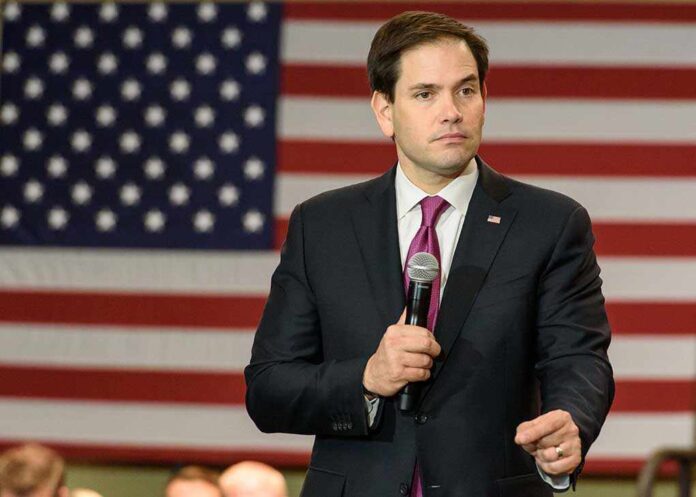The contentious policies posed by Marco Rubio under Trump’s lead have stirred a complex legal battleground, questioning the balance between national security and civil liberties.
Quick Takes
- Trump’s administration uses immigration law to deport individuals like Mahmoud Khalil over perceived foreign policy risks.
- This underscores a debate between the government’s foreign policy powers and citizens’ First Amendment rights.
- Marco Rubio supports visa revocations for behavior deemed harmful to U.S. interests.
- Critics argue this eradicates free speech and casts legitimate dissent as illegal.
A Legal Tightrope
The Trump administration is exploiting an obscure immigration law to deport Mahmoud Khalil, a permanent resident and Columbia graduate. Arrested on March 8, Khalil faces deportation over activities perceived as harmful to foreign policy. Critics emphasize non-citizens like Khalil generally enjoy First Amendment protections, complicating the legal narrative surrounding his case.
Khalil’s lawyers argue that deportation for his political expressions violates constitutional freedoms, questioning the use of national security grounds to limit speech. The provision, rarely cited, now propels Khalil into a challenging legal dilemma between policy interests and constitutional rights.
Rubio’s Stance
Secretary of State Marco Rubio plays a crucial role in endorsing these hardline immigration policies, advocating against campus disruptions. He claims recent actions are decisive against foreign nationals endangering security through protest or expressive conduct deemed detrimental to the U.S.
According to Rubio, “This is not about free speech. This is about people that don’t have a right to be in the United States to begin with.”
Rumeysa Ozturk’s case, involving co-authorship of an anti-Israel op-ed, illustrates the broad reach of these laws. Despite no proven ties to terrorist organizations, her academic criticisms allegedly subjected her to wrongful scrutiny. Local protests erupted in her defense, challenging the fairness of linking such speech to terrorism.
The US government's crackdown on pro-Palestine activists is a blatant attack on academic freedom and free speech.
▪️ US Secretary of State Marco Rubio boasts about revoking over 300 visas, calling activists "lunatics" in an open attempt to silence opposition to US support for… pic.twitter.com/Xg6G2Tzp9j
— Vpol (@VocalPolitics1) March 29, 2025
Implications for Civil Liberties
The invoked immigration provision, 8 USC 1227(a)(4)(C)(i), is criticized for its vague applicability that jeopardizes cherished civil liberties. According to Ramya Krishnan, lawyer at the Knight First Amendment Institute at Columbia, “The primary issue in the case, I think, that is going to be litigated is whether this is unconstitutional first amendment retaliation. If the first amendment means anything, it means that the government can’t lock you up or deport you because of your political views. That’s literally the most important thing about this country.”
With approximately 300 student visas revoked, this policy builds a precedent impacting non-citizens’ rights. Rubio’s actions prompt a significant discourse on aligning national security with constitutional pillars, scrutinizing future implications if judicial favor swings towards broad deportation prerogatives.
Sources:
- https://www.theguardian.com/us-news/2025/mar/16/mahmoud-khalil-first-amendment-trump
- https://www.nbcnews.com/news/latino/rubio-record-questioned-academics-immigration-crackdown-rcna197470
- https://reason.com/2025/03/31/defending-student-deportations-marco-rubio-equates-writing-an-anti-israel-op-ed-piece-with-starting-a-riot/











